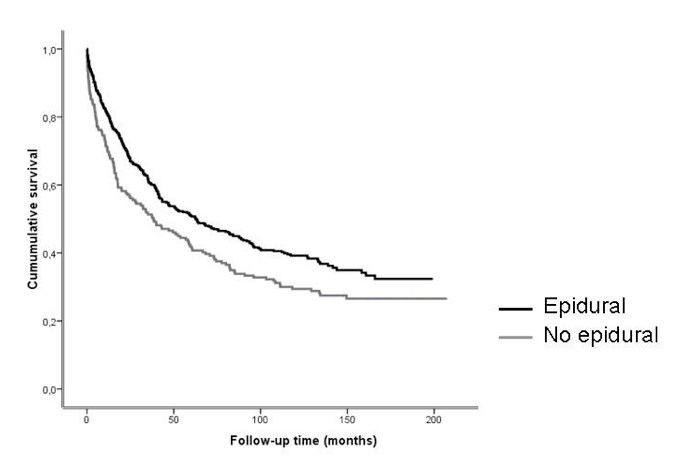Epidurale pijnstilling: associatie met overleving bij coloncarcinoom?
Vogelaar, F.J., Abegg, R., Lemmens, VE, Linden, J.C. van der, Cornelisse, H.G.J.M., Van Dorsten, F.R.C., Bosscha, K.
Voorzitter(s): Prof. dr. J.A. Roukema & dr. S.M.E. Engelen
Locatie(s): Auditorium
Categorie(ën): Parallelsessie; Topic: colorectaal
Surgery is still the mainstay of treatment for potentially curable colon cancer. Otherwise, the surgical stress response increases the likelihood of cancer dissemination and metastasis during and after cancer surgery. The possibility that anesthetic drugs can influence cancer recurrence is a subject of more recent debate. Based on animal studies and only a few clinical investigations, epidural analgesia during cancer surgery has been suggested to reduce cancer metastasis.
A follow-up study in a historical cohort was performed in 588 patients with colon cancer UICC stage I-IV undergoing surgery at our hospital over the period January 1995 to December 2003. The patients were allocated into two groups; those receiving epidural analgesia peri-operatively and those not receiving epidural analgesia, but patient-controlled analgesia. From all participants additional information was obtained from the Dutch Comprehensive Cancer Centre South. Follow-up measurements and visits were conducted according to the criteria of the Dutch Guidelines and all patients were followed up until January 2011. Mortality risks were estimated with Cox-proportional hazard models.
Of the 588 primary colon cancer patients, with a mean age of 69 years, 399 (68%) patients underwent colon surgery with epidural anaesthesia and 189 (32%) patients were operated upon without epidural anaesthesia. In patients receiving epidural analgesia a significant better overall survival was found compared to patients who did not receive epidural analgesia (HR 1.30 (95% CI 1,05-1.59), p=0.01). Results were adjusted for age, sex, UICC stage, chemotherapy, emergency surgery status and year of incidence.
In our study epidural analgesia during surgery for colon cancer was associated with significant better overall survival even after correcting for many confounding variables. Interestingly, the benefit of epidural analgesia seems to be more than only analgetic. A possible mechanisms is that regional anaesthesia attenuates the immunosuppressive effect of surgery. Also the lower requirements of opioid, which seems to inhibit the immune system, could play a role in the survival benefit.
The observed reduction in mortality rate when colon cancer surgery was performed with epidural analgesia suggests that prospective trials evaluating the effects of regional and morphine sparing analgesia on cancer recurrence are warranted.

- Over Vogelaar, F.J.
- Over Abegg, R.
- Over Lemmens, VE
- Over Linden, J.C. van der
- Over Cornelisse, H.G.J.M.
- Over Van Dorsten, F.R.C.
- Over Bosscha, K.